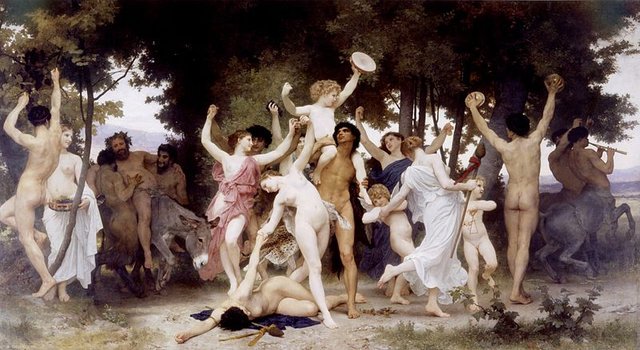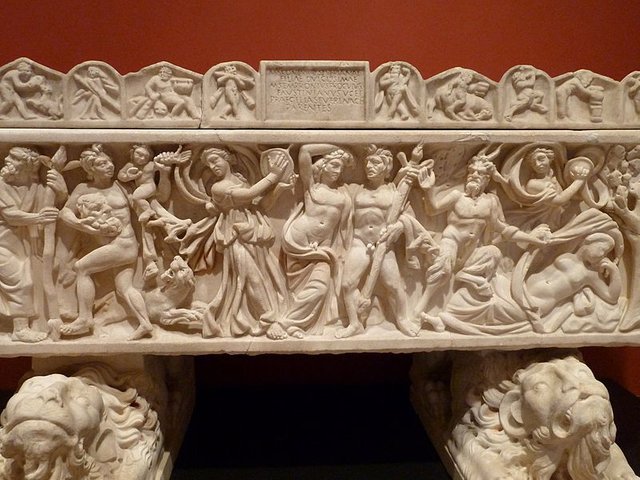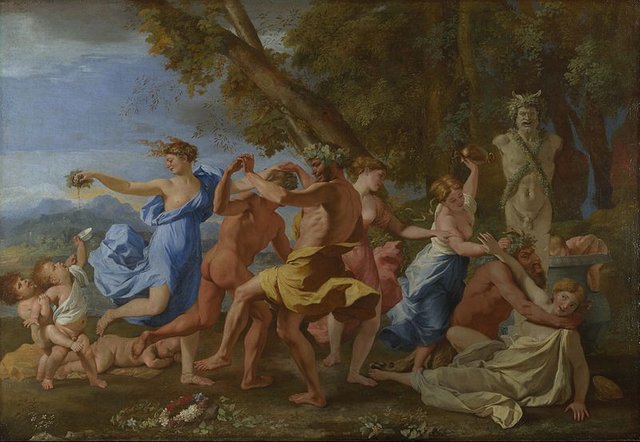HoR - Ancient Polytheism (2. The Bacchanalia)

The Bacchanalia
According to Titus Livius, they were occasions for giving free rein to debauchery, including orgiastic events. This caused the senate, fearing a religion not controlled by the state, to initiate an exemplary repression. In addition, there are other reasons that have led senators to make this decision, such as the probable fear of elements of foreign origin. This affair reveals the fears of the Roman state. Indeed, it was at first a religious matter, and it has taken a political turn in the light of circumstances.
We can still observe the senatus-consultes which were sent to all the provinces thanks to the bronze inscription of Tiriolo, found in Calabria. It shows a certain severity, but the cult will not really be removed as shown in the following inscription. Because the senate frightened that the god takes revenge, could not have suppressed a religious worship.
"10 As a priest, there is no man. As president, there is neither man nor woman.
11 Let no one hold a joint fund or a magistracy. [...]
15 Acts of worship, which are not performed in secret, neither in public or
16 privately; That no one should perform acts of worship outside Rome, unless [...]
19 Not more than five persons in all, men and women, who do not perform acts of worship
20 and that there are no more than two men and three women
21 otherwise with the permission of the urban praetor and the Senate, as stipulated above."
― Senatus Consultum de Bacchanalibus (~ 186 BC)

The roots of this god can be found in a very ancient Roman cult. Indeed, Dionysus was assimilated to Liber Pater. The latter is an agricultural deity of Asian origin. Bacchus (the Roman name for the god Dionysus) will then bring him a festive touch.
The Punic Wars were to cause a great number of Italians to take refuge in Rome. There has been an increase in superstitions, renewal of festivals and cults and also arrival of foreign cults (Dionysus). Outside Rome, worship was usually done in Dionysus and not Bacchus. It would seem that the first to have accepted Dionysus were the Etruscan.
But the senate did not really appreciate this foreign contribution. Indeed, many testimonies and denunciations described scenes of debauchery among the Romans, practicing this secret cult. Hence the scandal of the Bacchanalia (~ 186 BC).
"5 These were initiatory rites to which, at first, few people took part, but which later began to spread, affecting men as well as women. The pleasures of wine and feasts were added to religious practice, so as to mislead a greater number of minds.
6 When the wine, at night, and the promiscuity of men and women, of adults and of young people, had blotted out all the borders of shame, they began to indulge in all sorts of depravity, since everyone found the voluptuousness within his reach for which, by nature, he felt the strongest inclination ;"
― LIVY, Roman History, XXXIX, 8.5-8.6"7 And these debaucheries, which involved indiscriminately free men and women, were not the only kind of crime: false testimonies, falsifications of seals and wills, false denunciations issued from the same dispensary;
8 There again, there were poisonings and secret assassinations, to the point that sometimes there was not even a body to be buried."
― LIVY, Roman History, XXXIX, 8.7-8.8"12 The mother thus addresses the young man: during an illness, she had vowed to initiate him, immediately healed, to the mysteries of Bacchus; The gods, in their goodness, having fulfilled her wish, she wished to fulfill it; Ten days of chastity were necessary; On the tenth day, after the banquet and the ritual ablutions, she would take him to the sanctuary."
― LIVY, Roman History, XXXIX, 9.12"11 All this, we will do with the agreement and favor of the gods, who, indignant at seeing their majesty profaned by the contact of crime and debauchery, have pulled these from the darkness where they hid themselves to put them in broad daylight, and did not want them to be revealed to remain unpunished, but to be prosecuted and repressed."
― LIVY, Roman History, XXXIX, 16.11
*


TITE-LIVE, Histoire romaine, Livre XXXIX, texte établi et traduit par A.-M. ADAM, Paris, Les Belles Lettres, 1994
EURIPIDE, Les Bacchantes, Livre VI, texte établi et traduit par H. GREGOIRE et J. MEUNIER, Paris, Les Belles Lettres, 2011 L'inscription de Tiriolo, J.-M. PAILLER, Bacchanalia, La répression de 186 av. J.-C à Rome et en Italie, vestiges, images, traditions, Rome, Ecole française de Rome, 1998, pp. 57-60
Nice article about the myth and what is today's mundane celebration called Carnival. I personally prefer the what came before the Roman mythology, the celebration Dionysius mysteries near Delphi.
Thank you @awakedev :) I also have affinities with the ancient Greek cult of Dionysus. Still I find interesting how the relatives of the Roman power, especially Livy describe the participants of these mystery cults.
I understand. I personally have this prejudice in relation to Roman culture as a lesser copy of the Greeks. Although the Romans excel in organization and war.